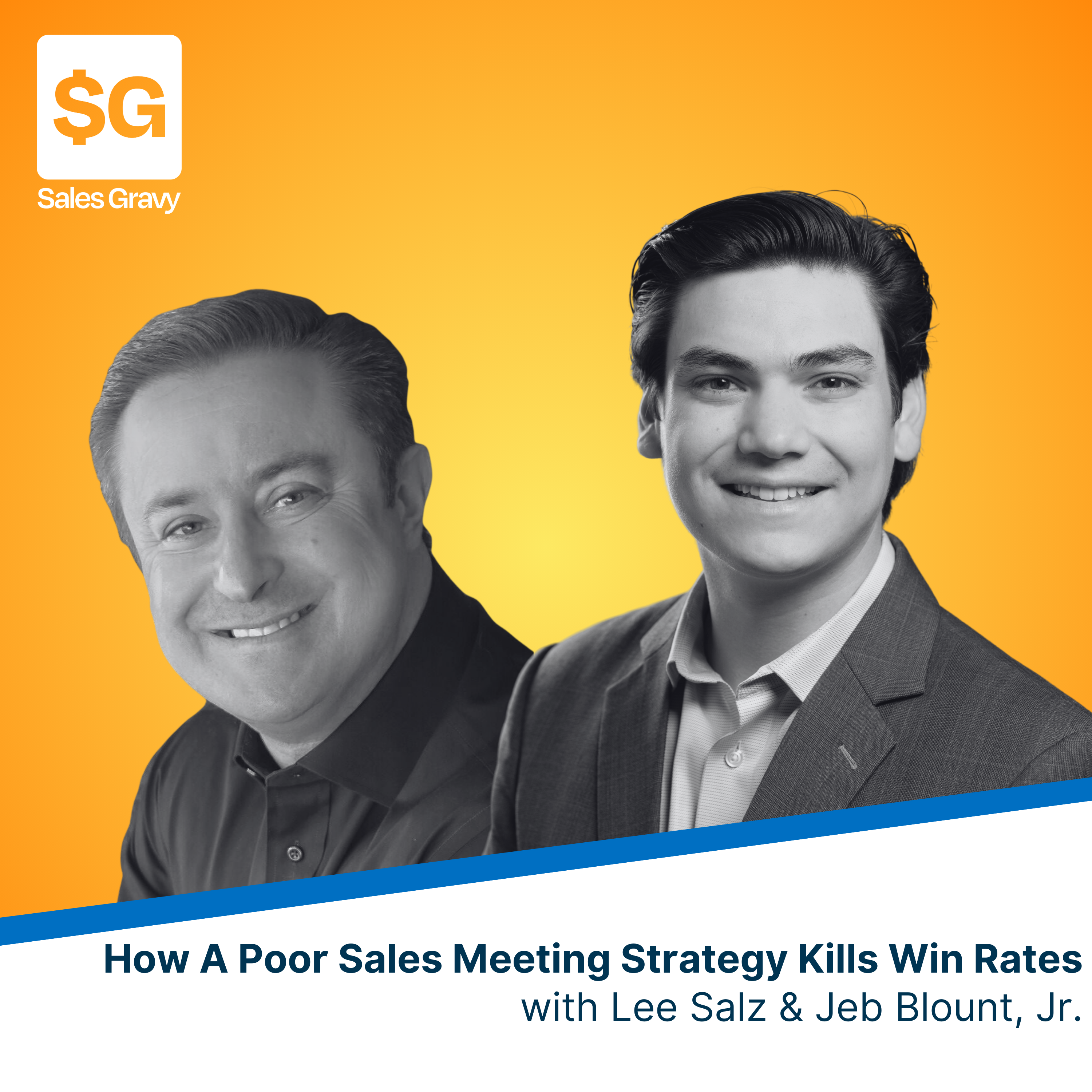How Emotional Regulation Impacts Sales Performance (Ask Jeb)
Update: 2025-09-09
Description
Here's a question that'll make you rethink everything about sales performance: What happens when your team has all the skills, tools, and training they need, but they're still underperforming because they can't regulate their emotions under pressure?
That's exactly what Natalie Brooks from Charlotte discovered when she noticed how drastically emotions were impacting her team's performance during tough selling days. Meanwhile, salespeople like Jordan from San Diego are making decisions they later regret—pushing forward on deals they know are wrong just because they look good on paper.
If you're nodding your head right now, you're witnessing one of the most overlooked aspects of sales performance: emotional regulation. And it's costing you deals, talent, and revenue.
The Dysregulation Problem: When Emotions Hijack Performance
Here's the brutal truth: When you're emotionally dysregulated or your nervous system is hijacked by stress, focusing on anything becomes nearly impossible. Your best discovery questions go out the window. Your qualifying discipline disappears. Your prospecting consistency evaporates.
Think about it. You can have the perfect sales process, but if your rep is in fight-or-flight mode from a string of rejections, they're not executing that process effectively. They're just going through the motions while their emotional state sabotages their performance.
This isn't just about "feeling better." This is about creating the mental and emotional foundation that allows elite sales performance to happen consistently.
Why Most Sales Leaders Miss This Completely
The reason most sales organizations ignore emotional regulation is the same reason they obsess over talk time metrics—it's easier to focus on activities than outcomes.
It's much simpler to say "make more calls" than to create an environment where your team feels safe enough to regulate their emotions and perform at their peak. But here's what happens when you ignore the emotional component of sales:
Your reps start making fear-based decisions. They chase deals they know are wrong fits because they're afraid of having an empty pipeline. They avoid difficult conversations because rejection feels personal. They burn out because they're running on adrenaline instead of sustainable energy.
Meanwhile, your top performers aren't just skilled, they've learned to manage their emotional state in a way that supports peak performance.
The Three Pillars of Emotional Regulation in Sales
Personal Regulation: The Foundation Everything starts with personal habits that support emotional stability. Your "why" becomes your anchor during tough moments. When you're tired, exhausted, or questioning what you're doing, that purpose pulls you through.
But purpose alone isn't enough. Your daily habits outside of work create the foundation for emotional regulation at work. Sleep, nutrition, exercise, stress management—these aren't "nice to haves." They're the infrastructure that supports your ability to stay sharp and focused when deals get challenging.
Team Regulation: Creating Safety As a leader, you have a responsibility to create psychological safety where your team can regulate together. This might look like mid-day resets where everyone takes a few deep breaths or does a quick activity to release tension from difficult calls.
The key is consistency. When emotional regulation becomes part of your team culture—not just something you talk about during tough times—it shows that peak performance includes emotional wellness.
Process Regulation: Trusting Your System Here's where emotional regulation meets sales discipline. When you have clear qualifying standards and you trust your process, you don't have to make emotional decisions about which deals to pursue.
Ultra-high performing salespeople show discipline by recognizing that they only ...
That's exactly what Natalie Brooks from Charlotte discovered when she noticed how drastically emotions were impacting her team's performance during tough selling days. Meanwhile, salespeople like Jordan from San Diego are making decisions they later regret—pushing forward on deals they know are wrong just because they look good on paper.
If you're nodding your head right now, you're witnessing one of the most overlooked aspects of sales performance: emotional regulation. And it's costing you deals, talent, and revenue.
The Dysregulation Problem: When Emotions Hijack Performance
Here's the brutal truth: When you're emotionally dysregulated or your nervous system is hijacked by stress, focusing on anything becomes nearly impossible. Your best discovery questions go out the window. Your qualifying discipline disappears. Your prospecting consistency evaporates.
Think about it. You can have the perfect sales process, but if your rep is in fight-or-flight mode from a string of rejections, they're not executing that process effectively. They're just going through the motions while their emotional state sabotages their performance.
This isn't just about "feeling better." This is about creating the mental and emotional foundation that allows elite sales performance to happen consistently.
Why Most Sales Leaders Miss This Completely
The reason most sales organizations ignore emotional regulation is the same reason they obsess over talk time metrics—it's easier to focus on activities than outcomes.
It's much simpler to say "make more calls" than to create an environment where your team feels safe enough to regulate their emotions and perform at their peak. But here's what happens when you ignore the emotional component of sales:
Your reps start making fear-based decisions. They chase deals they know are wrong fits because they're afraid of having an empty pipeline. They avoid difficult conversations because rejection feels personal. They burn out because they're running on adrenaline instead of sustainable energy.
Meanwhile, your top performers aren't just skilled, they've learned to manage their emotional state in a way that supports peak performance.
The Three Pillars of Emotional Regulation in Sales
Personal Regulation: The Foundation Everything starts with personal habits that support emotional stability. Your "why" becomes your anchor during tough moments. When you're tired, exhausted, or questioning what you're doing, that purpose pulls you through.
But purpose alone isn't enough. Your daily habits outside of work create the foundation for emotional regulation at work. Sleep, nutrition, exercise, stress management—these aren't "nice to haves." They're the infrastructure that supports your ability to stay sharp and focused when deals get challenging.
Team Regulation: Creating Safety As a leader, you have a responsibility to create psychological safety where your team can regulate together. This might look like mid-day resets where everyone takes a few deep breaths or does a quick activity to release tension from difficult calls.
The key is consistency. When emotional regulation becomes part of your team culture—not just something you talk about during tough times—it shows that peak performance includes emotional wellness.
Process Regulation: Trusting Your System Here's where emotional regulation meets sales discipline. When you have clear qualifying standards and you trust your process, you don't have to make emotional decisions about which deals to pursue.
Ultra-high performing salespeople show discipline by recognizing that they only ...
Comments
In Channel
























